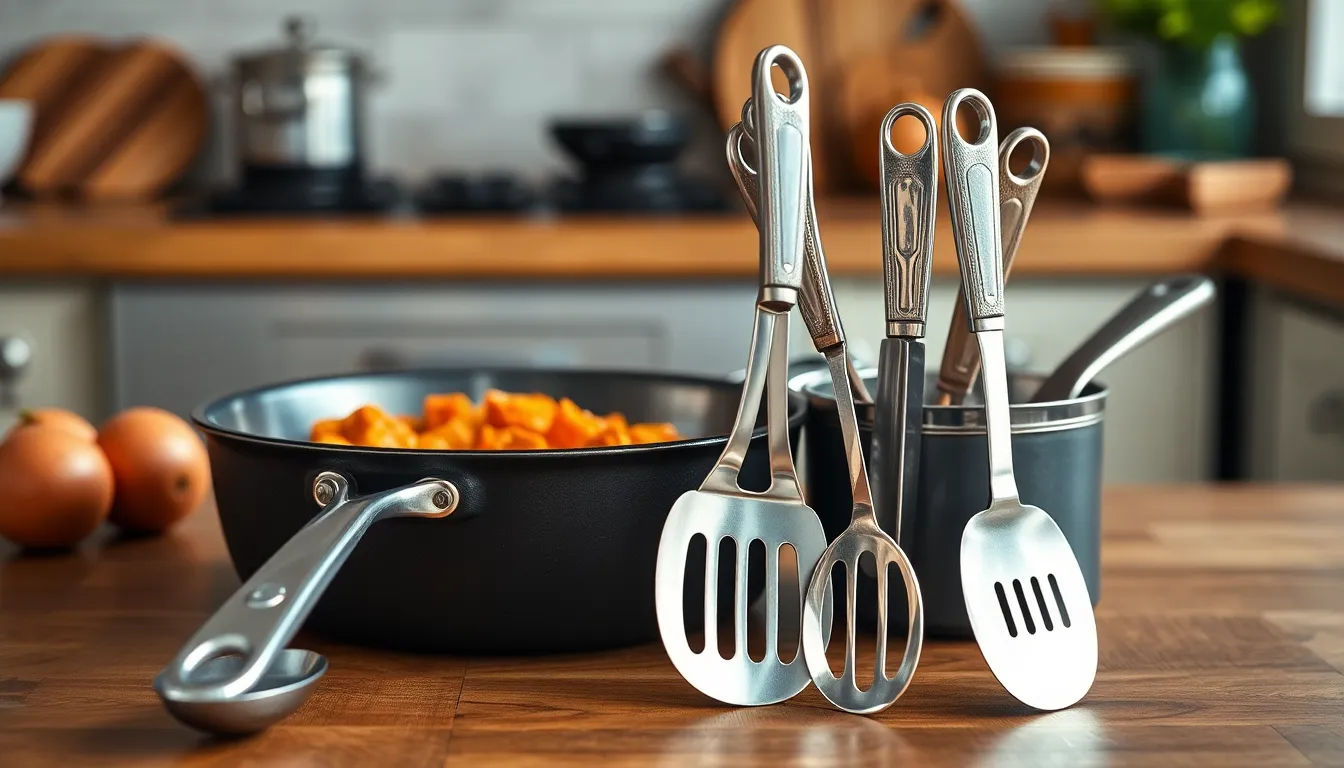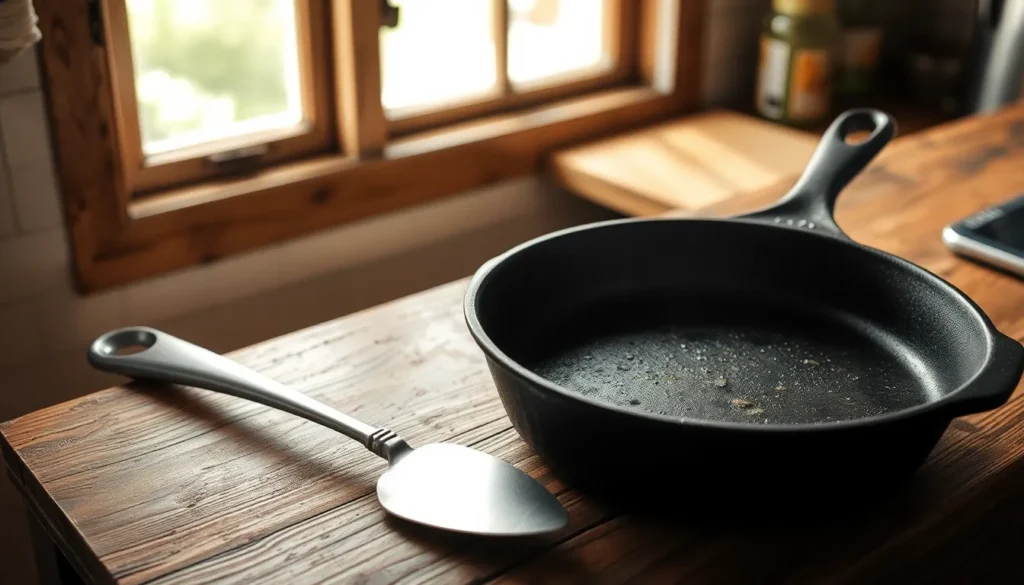Table of Contents
ToggleCast iron cookware has long been a favorite among home cooks and professional chefs alike. Its exceptional heat retention and even cooking make it a staple in many kitchens. However, when it comes to using metal utensils on cast iron, opinions often vary. Some swear by their metal spatulas while others warn against it, fearing scratches and damage to the seasoning.
Understanding the relationship between metal and cast iron is essential for maintaining the longevity of this beloved cookware. The right tools can enhance the cooking experience, while the wrong choices can lead to frustration and wear. In this article, we’ll explore whether it’s safe to use metal on cast iron and share tips on how to keep your cookware in top shape.
Overview of Cast Iron Cookware
Cast iron cookware features exceptional heat retention and even heat distribution, making it a favorite among both home cooks and professional chefs. This durable material withstands high temperatures and can transition seamlessly from stovetop to oven. Available in various forms, such as skillets, Dutch ovens, and griddles, cast iron cookware serves multiple cooking techniques, including frying, baking, and roasting.
Proper seasoning is vital for cast iron’s performance and longevity. Seasoning involves coating the cookware with a thin layer of oil, then heating it to create a non-stick surface and prevent rust. Over time, the seasoning develops, enhancing the cookware’s natural non-stick properties. Maintaining this seasoning requires regular care, such as avoiding harsh soaps and using gentle scrubbers.
Despite its toughness, cast iron can be sensitive to the use of metal utensils. While some metal utensils can be safely used, it’s crucial to avoid aggressive scraping, which may damage the seasoning and lead to rust. Silicone, wood, or plastic utensils are often recommended to maintain the integrity of the cookware, ensuring it continues to perform optimally over time.
Types of Metals Compatible with Cast Iron

Certain metals work well with cast iron cookware, allowing for safe and effective cooking while preserving the integrity of the seasoning.
Stainless Steel
Stainless steel utensils are compatible with cast iron cookware. They provide strength and durability, making them suitable for stirring, flipping, and serving. Unlike harsher metals, stainless steel won’t easily scratch the surface. They can withstand high temperatures without degrading. Using stainless steel spatulas or spoons maintains the cookware’s seasoning while enabling the user to effectively manage food.
Aluminum
Aluminum utensils can also be used with cast iron cookware, although caution is advised. Aluminum’s lightweight and non-reactive nature make it a convenient choice for cooking. However, frequent contact can lead to minor abrasions over time. It’s best to use aluminum tools with care, avoiding aggressive scraping that could damage the seasoning. Opt for thicker aluminum utensils to minimize wear and maintain the protective layer of the cast iron.
Benefits of Using Metal on Cast Iron
Using metal utensils on cast iron cookware offers several advantages when done thoughtfully.
- Durability: Metal utensils, especially stainless steel, can withstand high temperatures and offer enhanced durability, making them ideal for heavy-duty cooking tasks.
- Efficiency: Metal tools provide optimal leverage and control during cooking, facilitating easier flipping and stirring of food items.
- Versatility: Metal utensils are versatile, suitable for various cooking methods, including searing and sautéing, where robust materials are essential.
- Heat Conduction: Metal conducts heat effectively, allowing for more efficient cooking and quicker adjustments in temperature when needed.
- Removing Stuck Food: Metal utensils can assist in deglazing pans, making it easier to remove stuck food, enhancing flavor profiles in dishes.
- Long-Lasting: High-quality metal utensils resist warping or breaking, ensuring a long lifespan in the kitchen compared to other material options.
Understanding these benefits enables cooks to enjoy the advantages of metal utensils while taking care to protect the seasoning of cast iron cookware.
Risks and Considerations
Using metal utensils on cast iron cookware involves certain risks that affect both the cookware’s integrity and longevity. It’s crucial to understand these considerations to maximize the performance of cast iron while minimizing damage.
Scratching the Surface
Scratching occurs when metal utensils come into direct contact with the cast iron surface. Stainless steel utensils can cause superficial scratches, which may not immediately affect performance but can accumulate over time. Consistent use of sharp-edged metal tools increases the likelihood of visible wear. To protect the surface, using utensils with rounded edges or opting for silicone and wooden alternatives can prevent unintentional scratching.
Impact on Seasoning
The seasoning on cast iron cookware creates a non-stick surface and prevents rust. Metal utensils can disrupt this seasoning, leading to uneven cooking and potential food sticking. Scraping with metal can remove layers of seasoning, ultimately compromising the cookware’s effectiveness. Maintaining a smooth cooking surface involves using non-abrasive utensils to protect the seasoning, ensuring that the cast iron remains functional and well-maintained over time.
Best Practices for Using Metal Utensils
- Choose stainless steel utensils: Stainless steel offers durability and resistance to bending while minimizing the risk of scratching cast iron surfaces.
- Use rounded edges: Utensils with rounded edges apply less pressure to the seasoning layer, reducing the likelihood of damaging the protective coating.
- Opt for thicker aluminum tools: Thick aluminum utensils are less prone to abrasions and can safely interact with the cast iron without significant wear.
- Avoid aggressive scraping: Even when using metal utensils, aggressive scraping can disrupt the seasoning. Gentle stirring and scooping techniques promote longevity.
- Monitor utensil condition: Regularly inspect utensils for signs of wear or sharp edges. Replacing worn utensils prevents unintentional scratches on cast iron cookware.
- Limit metal use during seasoning maintenance: During the re-seasoning process, avoid metal utensils altogether. Stick to soft, non-abrasive materials to preserve the seasoning.
- Consider usage frequency: For routine cooking, mix metal utensils with alternatives like silicone or wooden utensils. This strategy balances durability with care for the cast iron surface.
- Follow cookware guidelines: Review manufacturer recommendations on utensil compatibility. Adhering to guidelines maximizes cookware performance and lifespan.
Using metal on cast iron cookware can be a balancing act between functionality and care. While certain metal utensils like stainless steel can be safe and effective, it’s crucial to approach their use with caution to preserve the seasoning layer. Opting for thicker aluminum tools and rounded edges can further minimize the risk of damage.
Mixing metal utensils with alternatives such as silicone or wood offers a practical solution to protect the cast iron surface. Regular inspection of utensils and adherence to manufacturer guidelines will enhance the longevity of the cookware. By understanding the interplay between metal and cast iron, cooks can enjoy the benefits of both while maintaining their beloved kitchen tools.




